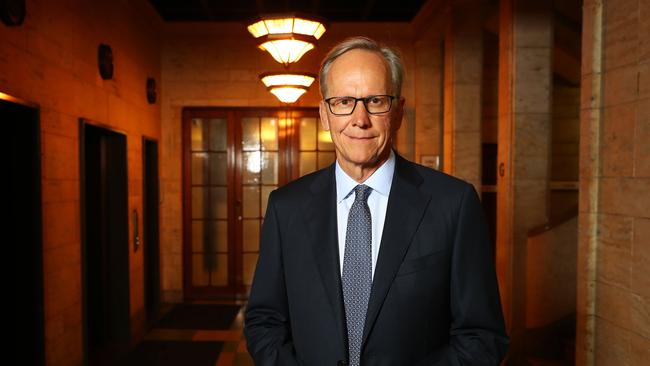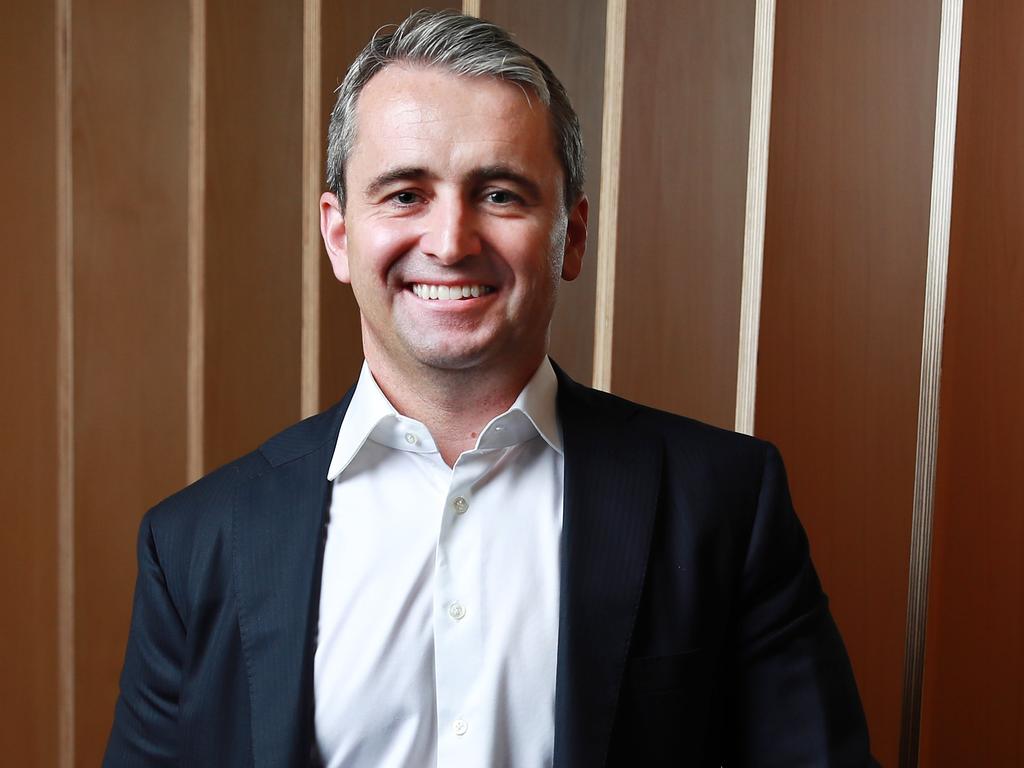Keybridge feud getting personal as Geoff Wilson and Nick Bolton square off
The personal feud between baby boomer fund manager Geoff Wilson and millennial entrepreneur Nicholas Bolton is shaping up as a doozy.

Since they met for a mostly convivial lunch at Rockpool in Sydney in June 2016, Gen Y entrepreneur Nicholas Bolton and baby boomer fund manager Geoff Wilson have not spoken.
It’s quite an achievement, because Wilson over the past four years has launched multiple bids to try to shake Bolton’s grip on the small investment company Keybridge, wracked up 14 related appearances before the Takeovers Panel, and invested in other listed companies partly colonised by Bolton or one of his affiliates.
Suffice it to say, neither contestant has banked a fortune from their never-ending arm-wrestle.
Wilson is untroubled, saying Keybridge was just one of more than 600 companies in which his $3.5bn Wilson Asset Management group has invested.
Any overlap with Bolton’s other activities was coincidental — the unintended outcome of two investors identifying value in the same stock.
Asked if it’s become personal, Wilson laughs. “I just haven’t got time for it to be personal,” he tells The Australian. “I haven’t spoken to Nick for four to five years.
“For me, Keybridge is $6m out of the $3.5bn we manage, and it gets the same proportion of my time.”
Bolton thinks otherwise, saying he has frequently tried to settle their differences.
“I’ve sent Geoff a number of texts. Other people have tried to mediate. I even offered him a board seat. But all to no avail,” he says.
As a 26-year-old, Bolton famously pitted himself against the likes of Macquarie Bank, Leighton Holdings and Deutsche Bank in the 2009 BrisConnections saga.
He comprehensively outplayed the three giants, banking a $4.5m cheque from Leighton in return for handing over voting rights that could have held sway over the $4.8bn Airport Link toll-road in Brisbane.
Now 38, and in a reversal of roles, a more closely cropped Bolton is chafing against Wilson’s pervasiveness, believing his foe has a dark, negative agenda.
He speculates that the fund manager, with an estimated fortune of $511m, incorrectly blames him for triggering an insider trading probe into Keybridge shares by the Australian Securities & Investments Commission.
It’s an issue which Bolton raised over lunch at Rockpool — somewhat indelicately, given his antagonist paid the bill.
Wilson is scornful. He says Bolton needs to “grow up; he really does”.
“Nick’s bellyached to me about (the ASIC matter),” he says.
“Anyone can trade in any share they want. If they do it illegally, they get into trouble. That’s how it works. Obviously he’s desperate.”

It’s complicated
As with everything to do with Keybridge, the story is complicated.
It involves trading in the stock by Sandon Capital, a third party known to Wilson and located on the same floor of a Sydney office building as WAM.
Bolton at the time was a Keybridge consultant while serving a three-year director’s ban until November 2018 — a finding he continues to vigorously appeal despite the expiry of the disqualification almost two years ago.
In breaking bread with Bolton at Rockpool, Wilson’s agenda was transparent.
He wanted the support of Bolton and his 22.6 per cent stake for a Keybridge restructuring proposal lodged by WAM with the ASX on May 12.
The day before, Sandon was a buyer of Keybridge shares.
The stock rallied in response to WAM’s proposal, which Wilson says was solicited by then-Keybridge chairman Andrew Moffat and included an off-market buyback priced in a range of 15c-20c a share, subject to due diligence.
Sandon sold its Keybridge holding for a profit in late May, before WAM withdrew its proposal in June.
The firm’s founder and managing director Gabriel Radzyminski says Sandon knew nothing of WAM’s restructuring proposal before it became public.
“We were asked by ASIC to answer some questions on a voluntary basis, and we did,” he said.
“I am not aware of any outcome of ASIC’s inquiries. ASIC had no reason to tell us and we had no reason to ask. We have had no further correspondence with ASIC on the matter since my discussion with them.”
Swift intervention
ASIC’s intervention in 2016 was swift. On May 31, lawyer Wendy Prince sent a notice to produce documents under section 33 of the ASIC Act to a then-Keybridge executive director.
The notice has been obtained by The Australian, along with Prince’s follow-up letter to all Keybridge’s directors on June 10.
In the letter, ASIC asks for Keybridge’s help “on a voluntary basis” in relation to WAM’s restructuring proposal.
Among other things, it seeks a detailed chronology of all events leading up to the announcement, and a complete list of all third parties who were aware of it before its public release.
ASIC also asks for the time and date when Keybridge approached the third parties, and “a complete list of names, position, work and mobile numbers of all individuals who represented the third parties who were aware of the announcement prior to its release”.
The same applied to individuals who represented Corporate Holdings Pty Ltd (formerly known as Wilson Asset Management Pty Ltd) or Wilson Asset Management International Pty Ltd (WAMI) and communicated with Keybridge in relation to the announcement.
ASIC asked for Keybridge’s response by no later than June 21, 2016. While Bolton was serving his disqualification order at the time, Keybridge announced three years later in May 2019 that he had resumed his tenure as CEO.
If Bolton had previously been passive, he flicked the switch to active last December, dispatching a letter to the boards of WAMI and Sandon and stating his “concern” about Sandon’s trading in Keybridge shares in 2016.
Reserving “all our (legal) rights”, he notes Sandon’s trading had drawn the attention of ASIC, and that Keybridge had complied with the regulator’s request to produce information and source material.
At a standstill
For Bolton, the nub of the issue was the “relationship” between WAMI and Sandon, such that Sandon’s purchase of Keybridge shares was allegedly in breach of a standstill deed. The purpose of the deed was to prevent WAMI or any of its associates from buying Keybridge shares for two months from March 18, 2016 while the restructuring proposal was under consideration.
Radzyminski says Sandon wasn’t even aware of the standstill deed at the time, and Wilson bats back every question about WAMI, Sandon and Keybridge.
He says he has “no idea” if Sandon bought Keybridge shares a day before the WAMI restructuring proposal became public, and then sold for a profit before the proposal was withdrawn.
“You’d have to ask the guys at Sandon,” Wilson says.
Did Sandon share office space with WAM? “They were on the same level as us. We didn’t share office space. They had an office and we had an office. But there’s no way Sandon could have known (about our intentions for Keybridge).”
Was Sandon captured by the standstill agreement? “Hey, Sandon’s got nothing to do with us.”
Nothing special
Wilson is adamant that Bolton should not feel so special about the attention he gets.
He says Keybridge, where contro remains in dispute after the expiry of a WAM takeover bid last month, is but one of 14 shareholdings held by WAM in listed investment companies.
“It’s all about working out the value of the assets, and they have some very interesting assets in Keybridge,” Wilson says.
“We valued the assets at higher than the price we bid — and we’re happy to bid for any company if the assets are undervalued — plus they had the ability to pay out 11c in fully franked dividends.
“And you know we like franking. But that was a secondary asset, although we look forward to getting that out one day.”
Wilson is not being entirely truthful about his love of franking.
In fact, it’s an obsession which has taken him to places where others fear to tread, like the political arena.
Franking fracas
The outspoken fund manager’s campaign in the 2019 federal election to ensure retirees — including many of his 85,000 shareholders — kept their franking credits was one of a handful of issues to swing the poll in Scott Morrison’s favour.
As The Australian recounted last March, Wilson was about to order at the canteen-style eatery Kitchen by Mike in the Sydney CBD just before Christmas when he spotted Labor Opposition Leader Anthony Albanese ahead of him in the queue.
He waited until Albanese ordered and then introduced himself.
“I said: ‘I’m Geoff Wilson and I’m happy to sit down and tell you my point of view about franking credits any time’,” Wilson recalled.
“He slightly recoiled, looked straight back at the cash register and just said quietly: ‘No thanks’.
“That was the closest I’ve got with the ALP about their franking policy.”
If Wilson was drawn to Keybridge because of its franking credits, they were also a feature in other companies where he has jousted with Bolton, such as their competing bids for the listed oil and gas business Molopo Energy.
Wilson says he and his superannuation fund have made money twice from investments in RNY Property Trust, for which Keybridge launched a bid last August.
Among other duels, Keybridge and Wilson’s super fund have locked horns over the confectionary company Yowie Group, with WAM also failing in September last year to dislodge the Bolton-affiliated Aurora Funds Management as the responsible entity for the high-yielding securities investor HHY Fund.
It’s a tangled web of competing interests, and Bolton concedes that Wilson’s activities have been a distraction.
“The one thing I’d say Geoff has achieved is taking the focus off running this poor company (Keybridge),” he says.
“It’s made it a lot more difficult to achieve his objectives.”
Wilson is unrepentant.
He says an unstable Keybridge register presented an opportunity to bid for the company.
The assets were undervalued and franking credits were up for grabs.
“The fact that Keybridge took a left-turn, a right-turn and a U-turn doesn’t stop the investment thesis,” Wilson says.
“You look at Warren Buffett when he started out back in the 1950s, when he just bought into closed-end funds at a discount.
“It’s the purest form of investing you can do.”
But what about all the other times that the duo has slugged it out, like a sedate business version of UFC? “It’s unfortunate that Keybridge’s performance as an investor has been pretty poor,” Wilson remarks.
“We hoped he (Bolton) was a smart investor. Unfortunately, not much of our faith has been repaid!”




To join the conversation, please log in. Don't have an account? Register
Join the conversation, you are commenting as Logout